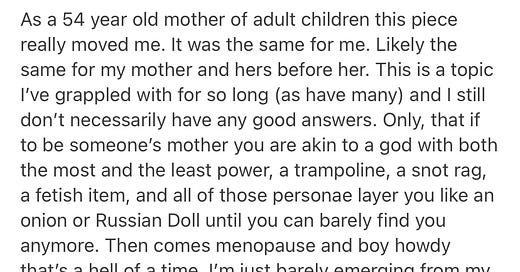Touched Out is 2 months old
She's holding her head a little more steady, and so am I
At two months old, a baby begins to hold its head steady. The internet— by which I mean BABYCENTER (do we need an essay about this terrible website?)— tells me that at around 8 weeks old an infant should also be able to turn its head from side to side and, maybe, smile.
Your 2-month-old is growing fast and may hit a few important developmental milestones, such as sleeping in longer stretches, settling into a more predictable feeding routine and – an exciting one – smiling! Keep giving your baby plenty of tummy time – it helps them build strength and gain head and neck control. Chances are, your baby won't be sleeping through the night anytime soon.
Books, many have argued, are not unlike babies. Yes, because birth is a metaphor that people like to use for everything from nation building to spiritual awakenings. But there are some distinct similarities between making books and making babies. During the writing process, as in pregnancy, writers struggle to understand this thing we are creating, to find a comfortable position, to sleep. Once its born, we fret about how our little book is doing in the world on its own, whether it’s growing or simply surviving, whether its making friends. Only occasionally does the book crack a smile at us. We never really know what we’re doing or supposed to be doing.
There’s a scene in my recent book, Touched Out, which turns 2 months old this week, in which I write about putting my first human baby on the floor. Staring at her. Had she been on her belly too long? Not long enough? Was she suffocating on the carpet? I flipped her over.
At that age, I would strategically place toys around my baby to encourage her to… ??? See? Crawl? It’s all a blur. The developmental milestones, what we actually did together day in and day out, what I thought I was accomplishing and what I wanted. But I remember clearly that, at 2 months old, I was struggling with acute parental anxiety. I was not sleeping. I was very concerned about head and neck control.
It was important to me, in Touched Out, that I not simply diagnose myself. I wanted instead to explore instead a mother’s own unique and confusing milestones, her own complex subjectivity. The way her mind and her body change as she ages into her new role, and reckons with the past of her body.
I was once a 2-month-old parent, learning to take walks down the street again— to use a stroller while trying not to worry that my infant’s brain was rattling around irreparably when we bumped over sidewalk cracks. Was my child, in fact, too young for a stroller?? Should we go home?? I was learning to leave the house again, to pack a baby bag, to begin using my body for things other than feeding. I was weaning myself off maxi pads that once held my insides in. I was trying to figure out who I had become.
Two months may be enough time to adjust to a new reality, but it’s not enough time to adapt to it, or to make any real sense of it.
I both love and hate when writers refer to books as babies. It is harder to write a book than it is to make a baby or be pregnant, or at least that’s how I experienced it. It is physically easier to push a book out into the world than it is to go through childbirth, but it’s emotionally far harder to release a book. Psychologically, emotionally, the postpartum days for both book and baby have been some of the most complex, challenging, joyous, and formative months of my life. But for the most part, the comparison between book and baby barely holds water.
And yet, we have long used birth as a metaphor for actual novelty, and so it’s a lovely symbolism—book as new creature, creativity as caring labor.
A book is, after all, a lot like a child once it’s released into the world. A book is never what you think it will be, it is not you even if it feels like a severed limb. You will fail at making it and at your efforts to control its interactions with the world.
But if the book is a baby, the book is thing that matters, the productive accomplishment, the fetish object; the creator, like the mother, is rendered as a passive ghost hovering outside the frame, unseen, underpaid and overworked, yes, but also riddled with anxiety about whether they have given their book-baby the best possible chance at success—whether they have done enough, or said too much, or acquiesced to too many parts of an ugly world.
We measure a baby’s success by how much they grow— sales, platform, reach, what have you. But what about the book’s mother—the author? How she has changed? How is she doing?



